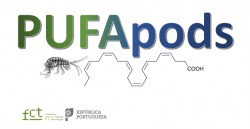
Globally, there is a generalised crisis on the supply of ingredients to formulated aquafeeds with suitable levels of long-chain polyunsaturated fatty acids (LCPUFA), namely those from the n-3 family (popularly known as omega 3). These aquafeeds are paramount to successfully culture marine fish and shrimp, whose demand continues to increase worldwide. Because of such crisis, former paradigms have been revised and the FAO currently advocates nutrient diversification rather than replacement as a pathway to fulfil present and future needs. Solutions incorporating the use of single-cell organisms know to biosynthesize LC-PUFA (such as microalgae) are only starting to be cost-effective and while the scientific community is already aware that some low trophic level organisms can bioaccumulate LC-PUFA (e.g., polychaetes and insects), they often only do so if supplied with feeds that already feature these nutrients (e.g., uneaten aquafeeds, side-streams of marine fish processing…). Nonetheless, in 2019, preliminary trials performed revealed that marine amphipods, a speciose group of small shrimp-like peracarid crustaceans, were able to successfully perform a trophic upgrade of their terrestrial plant-based diets (e.g., lupine meal and carrot leaves) into amphipods biomass enriched in n-3 LC-PUFA. Even more recently (in 2021), the repertoire and functions of proteins responsible for the elongation of very long-chain fatty acid (Elovl) were investigated in gammarid amphipods and, at least, three distinct elovl genes with putative roles in LC-PUFA biosynthesis were signalled (Elovl4, Elovl6 and “Elovl1/7-like”).
Project PUFApods aims to produce a new ingredient for marine aquafeeds formulation able to deliver n-3 LC-PUFA: gammarid amphipods biomass cultured using plant food processing side streams. To pursue this goal, PUFApods will use barcodes to perform a taxonomic characterization of autochthonous estuarine gammarid amphipods occurring in Ria de Aveiro coastal lagoon and use cutting-edge lipidomic tools to monitor their LC-PUFA (namely eicosapentaenoic (EPA) and docosahexaenoic acid (DHA)).
We hypothesize that gammarid amphipods colonizing transition waters, namely in the upper regions of estuaries, have evolved a more efficient enzymatic machinery to upgrade short-chain saturated fatty acids (SC-SFA) into LC-PUFA. In these habitats, gammarid amphipods will be exposed to a higher level of osmotic stress and experience trophic scenarios with a higher contribution of terrestrial vegetable foods. As such, these specimens are more likely to have evolved their ability to elongate and desaturate SC-SFA into n-3 LC-PUFA, as these biomolecules are paramount for osmoregulation and are not present in terrestrial vegetable foods.
We will test this hypothesis and modulate the trophic upgrade performance of gammarid amphipods under different salinity environments (from 5 to 45 salinity) and using different plant food processing side streams (potato peels, onion peels and lettuce leaves), while monitoring its effect on the survival, growth and yield of n-3 LC-PUFA of cultured specimens. We will also investigate the existence of nutritional programming by challenging offspring cultured on plant food processing side streams and offspring cultured with a regular marine diet with a plant-food-based diet and see if specimens raised with plant food processing side streams outperform conspecifics farmed with a marine based diet. Gene expression levels will be determined by monitoring mRNA of genes involved in the biosynthesis of n-3 LC-PUFA (Fad/Elovl).
Within PUFApods we will also develop and validate a prototype modular bioreactor for gammarid amphipods production using plant food processing side streams, with potential IP being properly monitored and protected whenever deemed relevant. Finally, we will evaluate the economic feasibility of gammarid amphipods production and incorporation in marine aquafeeds as a new ingredient.
PUFApods is committed to open science and FAIR data principles, being framed within high ethical, gender and equity standards.
